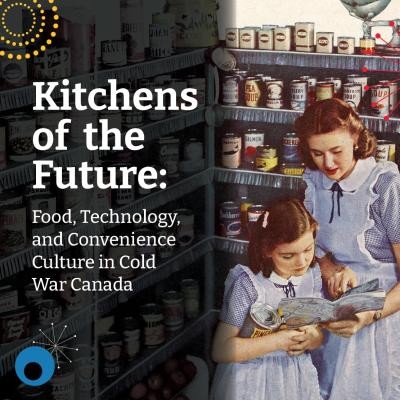
On Display Until February 2026
The University of Guelph’s McLaughlin Library is proud to highlight its latest exhibit, “Kitchens of the Future: Food, Technology, and Convenience Culture in Cold War Canada,” curated by Dr. Rebecca Beausaert, professor, Department of History, College of Arts and Ashley Shifflett McBrayne, associate, Archival & Special Collections. This thought-provoking exhibit explores how Canadians experienced the Cold War through the lens of food, drawing connections between historical moments and contemporary issues.
Exploring the Cold War Through Culinary Culture
The exhibit features a rich selection of cookbooks and ephemera from the Canadian Cookbook Collection, dating from 1945 to 1970. These materials reflect themes such as:
- The rise of convenience foods and new kitchen technologies
- Shifting gender roles and the emergence of television cooking shows
- A growing focus on health and nutrition
- The “Eat Local, Buy Canadian” movement in response to economic pressures
Visitors will discover how major global events, like the space race, nuclear tensions, and economic disruptions, shaped Canadian kitchens and consumer habits. The exhibit draws compelling parallels between Cold War-era concerns and today’s geopolitical climate, rising cost of living, and renewed interest in supporting local economies. “This exhibit is a reminder that sometimes history repeats itself and it’s important to understand how current events are predicated on past ones,” said Beausaert. “During the Cold War, for instance, Canadians also grappled with the America exceptionalism, economic aggression, and cultural influence.”
Objects That Tell a Story
In addition to archival materials, the exhibit includes objects on loan from the Wellington County Museum & Archives, the School of Hospitality, Food and Tourism Management, and the City of Guelph’s mayor Cam Guthrie’s personal collection of vintage blenders and kitchen electrics. “These objects have drawn a lot of interest and are recognizable to many visitors, making the exhibit very tangible and relatable,” said Shifflett McBrayne.
Spotlight on the Culinary Collection
The exhibit draws heavily from the University of Guelph Library’s Culinary Collection, one of the largest of its kind in North America. Housed in the library’s Archival and Special Collections, this collection includes thousands of cookbooks, manuscript materials, correspondence, photographs, clippings, and even sculptures. It features contributions from notable Canadian cookbook authors and culinary figures such as Una Abrahamson, Jean Paré, Edna Staebler, Anita Stewart, and Nick Schweizer.
These resources offer a rich tapestry of Canada’s culinary history, reflecting the nation’s evolving food culture, domestic life, and societal values. Researchers and visitors can explore titles through the library’s archives catalogue, and delve into the stories behind the recipes and the people who created them.
Educational Value and Student Engagement
The exhibit’s prominent location on the library’s main floor invites students to explore the holdings of Archival and Special Collections. The exhibit serves as a powerful educational tool, encouraging reflection on how the past informs the present and how exhibits can communicate complex ideas through artifacts.
An undergraduate student recently contacted the library to share their experience of the exhibit and the impact it had on them. Here’s what they had to say: “I always pass by your exhibit but decided today to look through it all mindfully. I love what you’ve done, and it was truly surreal to see not only books or ads older than me, but to know that a whole world and culture, practically alien to me truly existed. All this to say, I love your curation and selection of texts. Thank you for your hard work."
Visit and Learn More
The exhibit is open to all and will remain on display until February 2026. After its deinstallation, a digital version will be available on the What Canada Ate website. To learn more about the Canadian Culinary Collection begin browsing online or book an appointment.
Questions?
Contact us. We’re happy to help.
License

This work is licensed under a Creative Commons Attribution-NonCommercial-ShareAlike 4.0 International License.